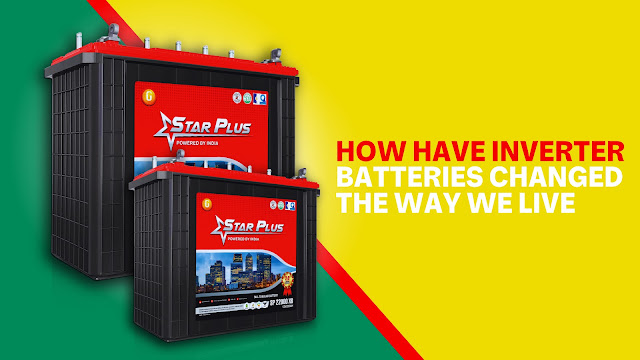Inverter batteries stand as a silent revolution in our lives. They have altered the way we perceive and deal with power interruptions. Beyond being mere backup power sources, these batteries have become indispensable. They ensure the continuity of our increasingly digital, connected, and electricity-dependent lifestyles. The batteries have redefined reliability, security, and productivity, fostering an environment where uninterrupted power is not a luxury but a necessity. In this blog, you will know the various ways inverter batteries have changed our lives.
Increased Reliability
Gone are the days of
sudden power disruptions due to outages. Inverter batteries have guided a new
era of reliability. We rely heavily on electricity to function and connect with
one another. Inverter batteries have bridged the gap between uninterrupted
power supply and daily necessities. They have transformed the way we function
during blackouts and offer a seamless transition to backup power. It allows us
to continue using essential appliances, powering devices, and maintaining
critical functions. Furthermore, inverter batteries have altered our approach
to managing power interruptions in a stress-free manner.
Enhanced Productivity
Inverter batteries have
reshaped the way we approach our daily tasks. Interruptions due to power
outages do not affect our productivity anymore. They enable businesses to
continue their operations. Electric disruptions prevent workflow, data loss,
and possible equipment damage. In a household setting, a power cut would result
in a cranky environment and prevent the dwellers from continuing daily chores. Tubular
inverter battery gives us the freedom to work and continue our daily
routines. It ensures that we can function properly without being bound to the
grid’s ability to take loads. It has transformed the way we perceive and
execute our daily tasks.
Preparing For Emergencies
Inverter batteries play an
important role in preparing for emergencies and offer a reliable contingency
plan when unforeseen situations arise. They act as a crucial backup during
natural calamities and ensure continuous power supply for essential devices
like medical equipment, communication tools, and emergency lighting. Their
ability to sustain power during crises, whether it's a storm, blackout, or any
other event disrupting the grid, provides a sense of security and readiness.
Families and businesses can stay connected, maintain essential services, and
navigate emergencies more effectively with the support of these batteries. They
are an integral part of emergency preparedness. Inverter batteries have
significantly altered how individuals and organizations prepare themselves for
unpredictable situations and offer a lifeline during crucial times.
Environmental Impact
Tubular batteries for
inverters have
significantly influenced our ecological footprint. They have fostered a shift
towards sustainable energy usage. These batteries have contributed towards the
reduction of reliance on non-renewable energy and mitigated environmental degradation.
Their ability to store excess energy generated during off-peak periods ensures
optimal utilization and minimizes wastage. This results in a lowered demand for
conventional power sources, subsequently reducing greenhouse gas emissions and
overall environmental impact. Moreover, the push towards greener technology and
the adoption of inverter batteries align with global efforts toward a cleaner,
more sustainable future. It showcases their pivotal role in shaping a more
eco-conscious way of life.
Technological Evolution
The evolution of inverter
batteries has catalyzed a remarkable transformation in our technological
landscape. These batteries have embraced advancements in energy storage,
transitioning from traditional lead-acid models to more efficient, eco-friendly
variants like lithium-ion batteries. This progression aligns with the larger
trend in technology, focusing on compactness, longevity, and smart features.
Modern inverter batteries integrate cutting-edge technology, offering features
like remote monitoring, digital displays for real-time information, and
compatibility with smart home systems. Their enhanced efficiency and longer
life spans mark a departure from conventional power backup systems, introducing
a new era of sophisticated, tech-driven energy solutions that seamlessly
integrate into our increasingly digital lifestyle.
Off-the-grid Access
Tubular Inverter batteries have revolutionized off-the-grid living, enabling access to reliable power sources in remote areas or during natural disasters. Their portability and ability to store renewable energy, like solar or wind power, have empowered communities living in remote regions. These batteries have become the backbone of microgrids and off-grid setups, providing consistent electricity for lighting, communication devices, and essential appliances. This accessibility to power ensures that even in the most secluded locations, individuals can enjoy the benefits of electricity, fostering improved standards of living and opening up opportunities for education, healthcare, and economic development.
The Bottom Line
Inverter batteries have
emerged as integral components, empowering us to embrace a lifestyle not
tethered to the grid's stability. Their impact transcends mere convenience,
offering us security, productivity, and a sense of preparedness during
emergencies. As technology continues to evolve, the future holds promises of
even more efficient, eco-friendly, and advanced solutions, reaffirming the
crucial role of inverter batteries in shaping our daily lives and their
potential to further revolutionize our relationship with continuous power
supply.







